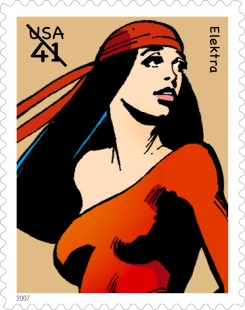Since June 1938, when Superman was introduced to comic book readers, the medium has been closely associated with superheroes. Superheroes have responded to social and political issues from the start, becoming patriotic defenders of national interests, for example, during World War II—the “Golden Age” of comic books.
 Given this mirroring of American society, it’s no wonder, then, that the all-male cast of comic book heroes began to change at this time, as well. Wonder Woman, the most recognizable female character in comics, became an iconic inspiration for countless women after her debut in All-Star Comics #8 in December 1941. As a worldwide ambassador of peace, she remains a figure of strength, beauty, and courage.
Given this mirroring of American society, it’s no wonder, then, that the all-male cast of comic book heroes began to change at this time, as well. Wonder Woman, the most recognizable female character in comics, became an iconic inspiration for countless women after her debut in All-Star Comics #8 in December 1941. As a worldwide ambassador of peace, she remains a figure of strength, beauty, and courage.
This positive image of a heroine readers could sympathize with and root for continued on in later years, gaining steam with the rise of feminism in the ’60s and ’70s. Marvel Comics‘ Spider-Woman evolved from the drugged and duped Jessica Drew into a costumed heroine and a member of the Avengers, Earth’s Mightiest Heroes. In 1959, DC Comics debuted Supergirl, Superman’s cousin, as a regular, recurring female counterpart to the original superhero. An impressionable teenager when she first arrived on Earth, Supergirl operated as her cousin’s “secret weapon” while adjusting to life on her new planet. Eventually, her existence was revealed to the world, which welcomed the Girl of Steel with open arms.
 With Marvel’s creation of Elektra as a love interest for superhero Daredevil in 1981, the role of women in comics changed again. No longer confined to characters of pure innocence and goodness, Elektra’s mercenary lifestyle challenged the terms by which readers define a hero(ine). Driven by tragedy and versed in the ancient ways of the ninja, the mysterious femme fatale kills for hire, loves for thrills, and brings destruction to all who are foolish enough to cross her path.
With Marvel’s creation of Elektra as a love interest for superhero Daredevil in 1981, the role of women in comics changed again. No longer confined to characters of pure innocence and goodness, Elektra’s mercenary lifestyle challenged the terms by which readers define a hero(ine). Driven by tragedy and versed in the ancient ways of the ninja, the mysterious femme fatale kills for hire, loves for thrills, and brings destruction to all who are foolish enough to cross her path.
These beloved superheroines and their twisting plots have helped keep ravenous comic book readers snatching up issue after issue for more than 70 years. Though their male colleagues still dominate the comic scene, the female characters get their due billing—and some of the most compelling story lines, if I do say so myself.
All characters and related elements TM & © DC Comics. SUPER HEROES is a jointly owned trademark.
Name(s) of character(s) and the distinctive likeness(es) thereof are Trademarks of Marvel Characters, Inc. and are used with permission. © 2006 Marvel Characters, Inc. All Rights Reserved.
 This stamp is one of two Superman stamps released in 2006. When did he make his first U.S. postage stamp appearance?
This stamp is one of two Superman stamps released in 2006. When did he make his first U.S. postage stamp appearance?


